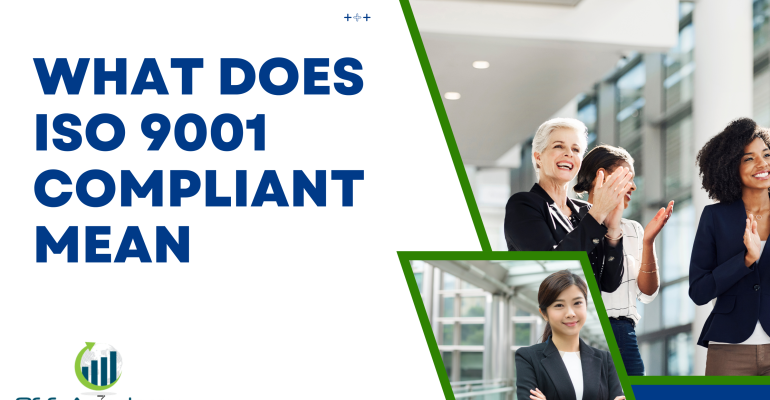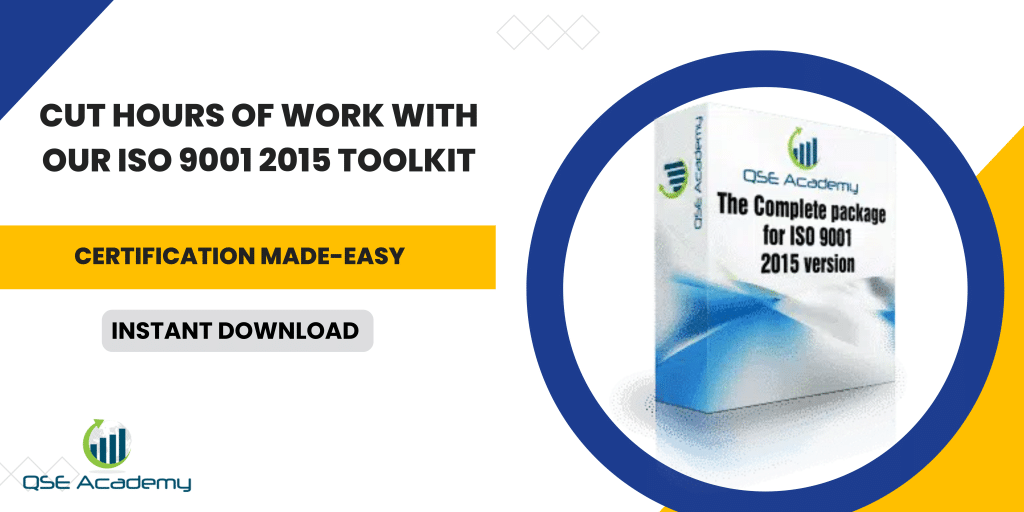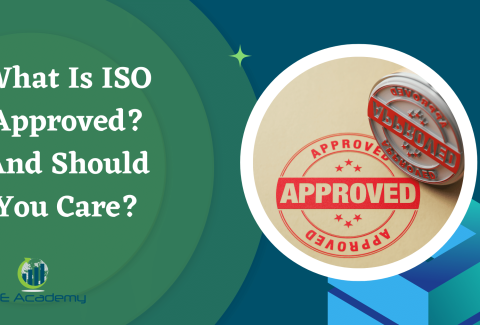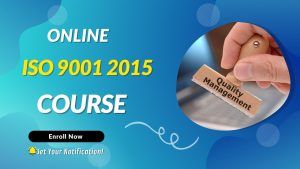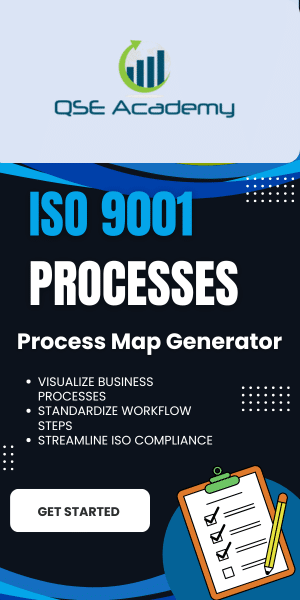What does ISO 9001 compliant mean?
Last Updated on October 13, 2025 by Hafsa J.
What does ISO 9001 compliant mean?
Have you ever come across the term ISO 9001 compliant and wondered what it actually means? You’re not alone! For many businesses, achieving ISO 9001 compliance is a proud milestone, but understanding what it entails can feel a bit like decoding a secret language.
Let’s simplify it. Being ISO 9001 compliant means that a business follows the internationally recognized ISO 9001 standard for quality management systems (QMS). It’s all about having structured processes in place to ensure consistency, efficiency, and, most importantly, customer satisfaction.
In this article, we’ll dive into what it really means to be ISO 9001 compliant, how it benefits businesses, and how it’s different from being certified. Whether you’re new to the concept or just looking to deepen your understanding, we’ve got you covered. Ready to demystify ISO 9001 compliance? Let’s get started!
What Is ISO 9001 and Why Does Compliance Matter?
Let’s start with the basics: ISO 9001 is an internationally recognized standard that provides a framework for quality management systems (QMS). In simple terms, it’s like a guidebook that helps businesses create processes to consistently deliver quality products and services. But what does it mean to be ISO 9001 compliant?
Being ISO 9001 compliant means your business has aligned its practices with the requirements outlined in the ISO 9001 standard. This isn’t just about checking boxes—it’s about building a system that works for your organization, improves efficiency, and ensures customer satisfaction. It’s a way of saying, “We take quality seriously, and we’re committed to doing things right.”
So, why does compliance matter? For starters, it’s a way to demonstrate that your business is organized, reliable, and focused on delivering value. Customers and partners are more likely to trust a business that’s ISO 9001 compliant because it shows you’ve invested in a proven system for maintaining quality.
Compliance also brings internal benefits. By following the principles of ISO 9001—like engaging employees, using data-driven decision-making, and focusing on improvement—you’ll create a smoother, more efficient operation. And let’s not forget, being ISO 9001 compliant gives you a competitive edge, especially in industries where quality is non-negotiable.
Now that we’ve covered what it means to be ISO 9001 compliant and why it matters, let’s explore the specifics of what compliance looks like in practice. You’ll see it’s not just about meeting standards—it’s about transforming how your business operates!
What Does It Mean to Be ISO 9001 Compliant?
So, what exactly does it mean to be ISO 9001 compliant? Let’s break it down into simple terms. When a business is ISO 9001 compliant, it means they’ve implemented a quality management system (QMS) that aligns with the requirements of the ISO 9001 standard. This system is designed to help organizations consistently deliver quality, improve processes, and meet customer expectations.
Being ISO 9001 compliant doesn’t necessarily mean the business has gone through the certification process—it simply means they’ve taken the time to meet the standard’s requirements. This includes everything from understanding customer needs and improving efficiency to fostering a culture of continual improvement.
1. Meeting the Core Requirements
At its core, being ISO 9001 compliant is about addressing the standard’s key principles. These include:
- Customer Focus: Ensuring that customer satisfaction is at the heart of everything you do.
- Leadership Commitment: Getting your leadership team actively involved in promoting quality.
- Risk-Based Thinking: Identifying potential risks and opportunities to improve outcomes.
- Process Approach: Viewing your operations as a series of interconnected processes to optimize efficiency.
When a business integrates these principles into its day-to-day operations, it’s on the path to becoming ISO 9001 compliant.
2. Following a Documented Quality Management System (QMS)
Documentation plays a big role in ISO 9001 compliance. To be ISO 9001 compliant, a business needs to document its policies, procedures, and processes clearly and effectively. This isn’t about creating mountains of paperwork—it’s about having the right information available to ensure consistency and accountability.
For example, if a customer places an order, the process for fulfilling that order should be clear, repeatable, and aligned with quality standards. Having these processes documented helps ensure that everyone on the team is on the same page, which is essential for maintaining compliance.
3. Committing to Continuous Improvement
Another key aspect of being ISO 9001 compliant is the commitment to ongoing improvement. The standard isn’t about achieving perfection overnight—it’s about consistently finding ways to do things better.
For instance, if a customer provides feedback, your business should have a system in place to review it, address any issues, and use the insights to improve. This cycle of improvement is a cornerstone of ISO 9001 compliance and helps businesses stay adaptable and competitive.
4. Delivering Consistent Quality
Finally, being ISO 9001 compliant means delivering consistent results. Whether you’re producing products, offering services, or managing projects, your customers should always know what to expect. This consistency builds trust, enhances your reputation, and keeps customers coming back.
Why It Matters
Being ISO 9001 compliant isn’t just about meeting a standard—it’s about building a better business. It’s a way to demonstrate that you’re serious about quality and committed to delivering value. Plus, it positions you as a reliable partner in the eyes of customers and suppliers.
Now that we know what it means to be ISO 9001 compliant, let’s take a closer look at how it differs from being certified and why both can be valuable for your business.
ISO 9001 Compliant vs. ISO 9001 Certified: What’s the Difference?
You’ve probably heard the terms ISO 9001 compliant and ISO 9001 certified used interchangeably, but they’re not quite the same thing. Understanding the difference can help you decide what’s best for your business. Let’s break it down in simple terms.
What Does ISO 9001 Compliant Mean?
Being ISO 9001 compliant means that your business has implemented a quality management system (QMS) that follows the principles and requirements of the ISO 9001 standard. It shows that you’ve aligned your processes with the framework to ensure consistent quality, improve efficiency, and meet customer expectations.
For example, you might have documented procedures, trained your team on quality practices, and adopted a risk-based approach to decision-making—all key elements of the ISO 9001 standard. However, if you’re ISO 9001 compliant, you haven’t necessarily gone through an external certification process to prove it.
What Does ISO 9001 Certified Mean?
On the other hand, being ISO 9001 certified means that an accredited third-party certification body has audited your QMS and confirmed that it fully meets the ISO 9001 requirements. Certification involves a formal assessment process where auditors review your documentation, observe your processes, and verify compliance with the standard.
Think of it as the next step beyond compliance. While being ISO 9001 compliant shows that you’re following the standard, certification adds a layer of credibility by providing independent verification.
When Is ISO 9001 Compliance Enough?
For some businesses, being ISO 9001 compliant is enough. If you’re not required to have formal certification by customers, regulators, or partners, demonstrating compliance internally can still bring plenty of benefits. It helps you improve your processes, enhance customer satisfaction, and build trust.
For example, a small startup might choose to focus on aligning with the ISO 9001 standard without seeking certification right away. This allows them to reap the benefits of a quality management system without the added cost or time commitment of certification.
When Should You Aim for ISO 9001 Certification?
Certification is often necessary when your business needs to prove its quality management practices to customers, suppliers, or regulatory bodies. In industries like manufacturing, healthcare, or government contracting, being ISO 9001 certified is often a requirement for doing business.
It’s also a great choice if you want to stand out in competitive markets. The certification serves as a badge of credibility that can open doors to new opportunities and strengthen relationships with clients and partners.
Why It’s Important to Understand the Difference
Whether you aim to be ISO 9001 compliant or pursue full certification, both approaches show your commitment to quality. The key is choosing the path that aligns with your business goals, industry needs, and customer expectations.
Now that you know the difference between compliance and certification, let’s explore how your business can become ISO 9001 compliant and start enjoying the benefits of this internationally recognized standard.
How to Become ISO 9001 Compliant
If you’re ready to take the next step and make your business ISO 9001 compliant, you might be wondering where to start. The good news? It’s not as overwhelming as it might seem! With a clear plan and a step-by-step approach, you’ll be well on your way to aligning with this internationally recognized standard. Let’s walk through the process together.
1. Understand the Standard
The first step in becoming ISO 9001 compliant is to understand what the standard is all about. ISO 9001 is built around key principles like customer focus, leadership involvement, and continuous improvement.
Grab a copy of the standard or research summaries online to familiarize yourself with its structure and requirements. Don’t worry—you don’t need to be an expert right away! Just focus on understanding the core concepts and how they apply to your business.
2. Perform a Gap Analysis
A gap analysis is like taking a snapshot of where your business stands today. It helps you identify areas where your current processes align with ISO 9001 and areas where there’s room for improvement.
For example, do you already have a system for collecting customer feedback? Are your processes documented and easy to follow? A gap analysis will give you a roadmap for becoming ISO 9001 compliant, so you know exactly what to work on.
3. Develop and Implement a QMS
To be ISO 9001 compliant, you’ll need to have a quality management system (QMS) in place. Think of your QMS as the backbone of your operations—it’s where you document your policies, processes, and procedures to ensure consistency and quality.
The key here is to tailor your QMS to your business. It doesn’t need to be overly complex; it just needs to work for you. For instance, a small retail shop’s QMS might focus on inventory management and customer service, while a manufacturer’s QMS would address production workflows and supplier relationships.
4. Train Your Team
Your employees play a huge role in making your business ISO 9001 compliant, so it’s essential to get them on board. Hold training sessions to explain the principles of ISO 9001, how the QMS works, and what their roles are in maintaining compliance.
When your team understands the “why” behind ISO 9001 and how it benefits the business, they’ll be more motivated to embrace the changes and contribute to the system’s success.
5. Conduct Internal Audits
Internal audits are like a dress rehearsal for ISO 9001 compliance. They allow you to evaluate your processes, identify areas for improvement, and ensure everything aligns with the standard.
Use these audits as an opportunity to fine-tune your QMS and address any gaps before moving forward. Regular internal audits also help you maintain compliance over time, keeping your system running smoothly.
6. Focus on Continuous Improvement
One of the key principles of ISO 9001 is continuous improvement. Being ISO 9001 compliant isn’t a one-time effort—it’s an ongoing journey. Regularly review your processes, collect feedback, and look for ways to make things better.
For example, if you notice that customers frequently ask the same question about a product, you could update your website or train your team to address it proactively. These small, consistent improvements add up over time and help your business stay competitive.
The Bottom Line
Becoming ISO 9001 compliant is a valuable investment in your business’s future. By following these steps—understanding the standard, conducting a gap analysis, developing a QMS, training your team, and committing to improvement—you’ll create a system that enhances quality, builds trust, and drives success.
Ready to get started? Remember, the journey to becoming ISO 9001 compliant is all about progress, not perfection. Take it one step at a time, and before you know it, your business will be aligned with one of the world’s most respected quality standards. Let’s make it happen!
Benefits of Being ISO 9001 Compliant
Now that you know how to become ISO 9001 compliant, let’s talk about why it’s worth the effort. Sure, it takes some time and planning, but the benefits of aligning your business with the ISO 9001 standard go far beyond just meeting requirements. Let’s dive into some of the biggest advantages and how they can make a real difference for your business.
1. Build Trust and Confidence with Customers
One of the most immediate benefits of being ISO 9001 compliant is the trust it builds with your customers. When they see that your business follows a globally recognized quality standard, it reassures them that they’re in good hands.
For example, imagine you’re choosing between two suppliers. One says they’re ISO 9001 compliant, and the other doesn’t mention quality standards at all. Who would you trust more? That’s the power of compliance—it shows customers you’re serious about delivering consistent quality.
2. Streamline Your Operations
Being ISO 9001 compliant isn’t just about impressing customers; it’s also about making your business run more efficiently. The ISO 9001 standard encourages you to evaluate your processes, eliminate inefficiencies, and focus on what truly adds value.
For instance, you might discover ways to reduce waste, shorten production times, or improve communication between teams. These changes don’t just save time—they also save money and make your business more competitive.
3. Gain a Competitive Edge
In today’s competitive marketplace, standing out is more important than ever. Being ISO 9001 compliant can give you that edge. Many clients, particularly in industries like manufacturing, healthcare, and logistics, prefer to work with businesses that follow ISO standards—or even require it.
By aligning with ISO 9001, you’re positioning your business as a reliable, professional partner. This can open doors to new opportunities, whether it’s landing a big contract, expanding into new markets, or attracting high-value clients.
4. Foster a Culture of Continuous Improvement
One of the most valuable aspects of being ISO 9001 compliant is the mindset it fosters within your organization. The standard isn’t just about meeting requirements—it’s about continuously finding ways to do things better.
When your team embraces this culture of improvement, it leads to innovation, adaptability, and long-term success. Whether it’s refining your customer service processes or adopting new technologies, the commitment to improvement helps your business stay ahead of the curve.
5. Reduce Risks and Enhance Decision-Making
ISO 9001 compliance also encourages businesses to adopt a proactive approach to managing risks. By identifying potential challenges and addressing them before they become problems, you can protect your operations and maintain customer satisfaction.
At the same time, being ISO 9001 compliant means using data to guide your decisions. Whether it’s tracking customer feedback or analyzing operational performance, this evidence-based approach helps you make smarter, more informed choices.
6. Strengthen Employee Engagement
When your business becomes ISO 9001 compliant, it’s not just about systems—it’s about people. Employees benefit from having clear roles, responsibilities, and expectations. They also feel more involved when they see how their work contributes to the business’s goals.
This sense of purpose and clarity boosts morale and productivity, creating a workplace culture that thrives on collaboration and success.
Why Being ISO 9001 Compliant Is Worth It
Becoming ISO 9001 compliant isn’t just a box to check—it’s a game-changer for your business. From improving customer trust to streamlining operations, the benefits touch every corner of your organization.
If you’re ready to take your business to the next level, aligning with ISO 9001 is a step in the right direction. It’s about more than meeting a standard—it’s about building a stronger, more efficient, and more trusted business. So, what’s stopping you? Let’s get started on the journey to becoming ISO 9001 compliant today!
Why Being ISO 9001 Compliant Matters
So, we’ve talked about what it means to be ISO 9001 compliant, how to achieve it, and the incredible benefits it brings. But why does it truly matter for your business? Let’s connect the dots and see how aligning with this internationally recognized standard can make a lasting impact—not just for today, but for the long haul.
1. It Shows You’re Serious About Quality
Being ISO 9001 compliant is like wearing a badge of honor that says, “We care about quality, and we’ve built our business around it.” Whether you’re serving customers, working with suppliers, or pitching to potential clients, this commitment makes you stand out as a reliable and trustworthy organization.
Think about it—when customers see that you’ve taken the time to align with ISO 9001, it instantly builds confidence. It’s a way of proving that you’re not just meeting their expectations but exceeding them with consistent, high-quality results.
2. It Future-Proofs Your Business
The business world is always changing, whether it’s due to shifting customer demands, technological advancements, or new industry regulations. Being ISO 9001 compliant helps you stay ahead of the curve by creating a flexible system that evolves with your business.
For example, the focus on risk-based thinking in ISO 9001 encourages you to identify and address challenges early. This proactive approach doesn’t just protect your business—it positions you to seize opportunities in a competitive market.
One of the often-overlooked advantages of being ISO 9001 compliant is the impact it has on your team. By clarifying roles, responsibilities, and processes, ISO 9001 helps create a sense of unity and purpose within your organization.
When everyone understands their part in delivering quality, it’s easier to work together toward shared goals. This kind of alignment not only boosts efficiency but also creates a workplace culture that thrives on collaboration and accountability.
4. It’s an Investment, Not an Expense
Some businesses hesitate when they think about the time and resources required to become ISO 9001 compliant. But here’s the truth: it’s an investment that pays off in countless ways.
The streamlined processes, stronger customer relationships, and improved efficiency you gain far outweigh the initial effort. Plus, the competitive edge you earn can open doors to new opportunities that wouldn’t have been possible otherwise.
5. It Sets the Stage for Long-Term Success
At its core, being ISO 9001 compliant isn’t just about meeting a standard—it’s about building a foundation for sustained growth. The principles of ISO 9001, like continuous improvement and customer focus, are designed to keep your business moving forward, no matter the challenges you face.
When you embrace these principles, you’re not just improving for today—you’re creating a system that supports success year after year.
Final Thoughts
Being ISO 9001 compliant matters because it’s about so much more than compliance—it’s about creating a business that’s reliable, efficient, and built to thrive. From gaining customer trust to preparing for the future, aligning with ISO 9001 is a decision that delivers long-lasting value.
So, whether you’re just starting your journey or already making progress, remember this: every step you take toward becoming ISO 9001 compliant is a step toward a stronger, more successful business. You’ve got this! Let’s make quality the cornerstone of everything you do.
Ready to move from ISO 9001 theory to implementation?
Get the exact tools you need to write your documentation, train your team, map your processes, and pass your audit—without wasted time or guesswork.

make ISO standards less intimidating and more approachable for everyone.
Whether it’s ISO 9001, ISO 22000, or the cosmetics-focused ISO 22716, I’ve spent my career
turning complex jargon into clear, actionable steps that businesses can actually use.
I’m not here to call myself an expert—I prefer “enthusiast” because I truly love what I do.
There’s something incredibly rewarding about helping people navigate food safety and quality management systems
in a way that feels simple, practical, and even enjoyable.
When I’m not writing about standards, you’ll probably find me playing Piano 🎹, connecting with people, or diving into my next big project💫.
I’m an engineer specialized in the food and agricultural industry
I have a Master’s in QHSE management and over 12 years of experience as a Quality Manager
I’ve helped more than 15 companies implement ISO 9001, ISO 22000, ISO 22716, GMP, and other standards
My clients include food producers, cosmetics manufacturers, laboratories, and service companies
I believe quality systems should be simple, useful, and efficient.

